1. Away From Her (Sarah Polley)
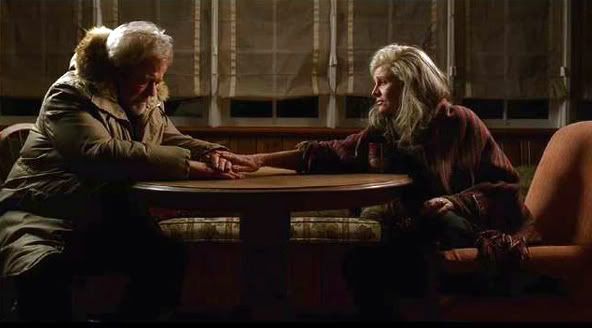
29 year old Sarah Polley's directorial debut, based on Alice Munro's short story A Bear Came Over The Mountain displayed a grace and maturity that was unequalled by any other filmmaker or film this year. Tackling the tough subject of Alzheimer's would be a difficult task for any director, but that Polley does so with such careful consideration and measured tones makes her film all the more remarkable. There are no big emotional scenes or dramatic crescendos, but simply the fallout of diagnosis marked by quiet loss, glimmers of hope and understated strength. Though much of the acclaim for the film has fallen on Julie Christie's shoulders, the entire cast is remarkable. But ultimately, the film belongs in the hands of Polley, and with this film, she marks herself as a serious artist, an undeniable talent and one of the most promising young directors to arrive in ages.
2. The Assassination Of Jesse James By The Coward Robert Ford (Andrew Dominik)
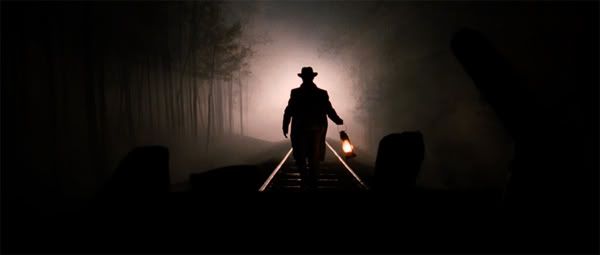
On paper, the delayed release dates and rumors of post-production battles between director Andrew Dominik and Warner Brothers spelled disaster. As Dominik struggled to bring his initial four-and-a-half-hour cut of the film down to something manageable, Warner Brothers occasionally brought in outside editors to take a crack at it. Even producer Ridley Scott and producer/star Brad Pitt had their input. Eventually, Dominik delivered his final cut, and Warner Brothers, who already had reservations about Dominik's contemplative western, ultimately dumped the film into limited markets with few press screenings or advertising. The film became a cause celebre among films fans and it's easy to see why. The Assassination Of Jesse James By The Coward Robert Ford is a visually stunning, ruminative film about the illusion of celebrity, the intangibility of myth and the allure of fame. Brad Pitt is solid in the lead as a slowly unraveling and paranoid Jesse James, but the film belongs to Casey Affleck in his breakout performance as Robert Ford. All raw nerves and wounded pride, Ford struggles to reconcile the real Jesse James with the hero he read about in dime store novels. Structured like the very serials that Ford read, and guided by an erudite voiceover narration, Dominik's film is a fascinating journey into myth and memory.
3. No Country For Old Men (Coen Brothers)
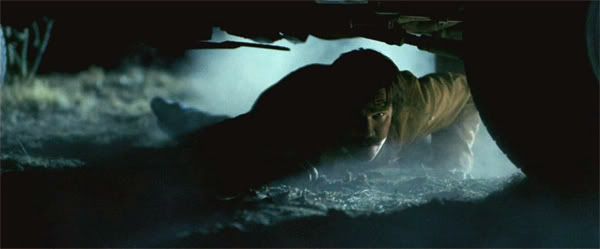
The Coen Brothers returned this year with their best film in over a decade, and perhaps one of the most accomplished films of their careers. To explain the film would take away many of the surprises, but ultimately, the film concerns three men who desperately try to outrun their individual paths. Sheriff Bell (Tommy Lee Jones), Vietnam veteran Llewelyn Moss (Josh Brolin) and relentless killer Anton Chigurgh (Javier Bardem) tempt, dodge and ultimately confront the fates their actions inevitably lead them to. The much discussed ending is perfect, adding a note of terrifying uncertainly to the Coen's ultimately grim assessment of their characters. Flawlessly constructed and heart-stoppingly suspenseful, the Coens have raised their already high bar to a whole new standard.
4. Zodiac (David Fincher)

For his sixth film, David Fincher returned to the serial killer genre that made his name famous when he directed Se7en. However, where that film explored the dark motivations of the fictional killer at its core, Fincher’s masterful Zodiac terrifies in completely different ways. Based on the true story of the Zodiac killer that cast a haunting shadow over the San Francisco area during the late '60s and early '70s, it is the seemingly random nature of the slayings and its victims that chills most of all. Fincher's film is less concerned with the methods and mind of the killer, than with the gruelling task of the policemen and press who desperately tried to overcome bureaucratic red tape, mountains of false leads and limited resources to capture him. What begins as a standard genre tale patiently evolves into a film about obsession. As the killer remains unidentified and years begin to pass, it's the lone work of Robert Graysmith, a former political cartoonist that keeps the case alive. His home becomes a library of boxes filled with notes and files, while his marriage eventually succumbs to his unrelenting quest for an answer. This obsessive nature carries over behind the camera as well, as Fincher, from the opening frame using the oldschool Paramount logo, to the meticulous set design, to the gorgeously rendered CGI backdrops doesn't miss a single detail in reconstructing 1970s San Francisco. And as the film spans several decades, Fincher employs some clever tricks to mark the passage of time, from the fast frame of a skyscraper going up to the now famous blackout sequence (available on the director's cut DVD) which uses an audio montage of pop hits and news sound bytes to mark the transition from the '70s to the '80s. Fincher's control behind the camera and in the editing room has never been stronger. In a film that gives the audience a dearth of information including multiple suspects, locations and clues, Fincher conveys every fascinating morsel clearly. And we can't help but to be become as obsessed as the filmmaker and his characters as they desperately try to close the case.
5. There Will Be Blood (Paul Thomas Anderson)
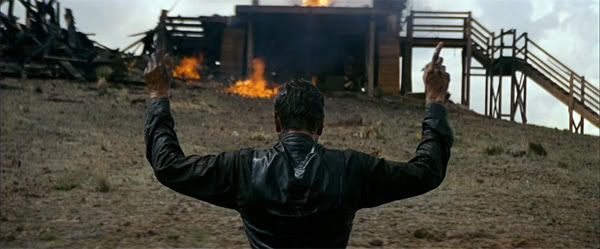
Paul Thomas Anderson has never been short on ambition. Whether it has been Magnolia, his sprawling tale about lost souls in Los Angeles; Boogie Nights, the seemingly unfilmable story about the rise and fall of a young porn star or Punch Drunk Love, a slightly skewed fairy tale romance involving pudding, a harmonium and Adam Sandler, Anderson has proven himself to be up to the challenge. However, when a teaser for There Will Be Blood appeared online last summer, no one could have predicted how much of a left turn Anderson had decided to take. Moving away from his safe cast of regulars, and even his usual scoring collaborator Jon Brion, There Will Be Blood is Anderson's bravest, boldest departure yet. Based loosely on Upton Sinclair's Oil!, the film is equal parts Treasure Of The Sierra Madre , Citizen Kane and The Shining that all combine into something that defiantly avoids categorization. Everything from the brilliant, nearly silent opening twenty minutes, to Jonny Greenwood's sparse, avant garde score to Daniel Day Lewis' already legendary portrayal of ruthless oil prospector Daniel Plainview defies convention. While the Great American Novel has yet to be written, Paul Thomas Anderson, with unparalleled verve, audacity and control of his craft comes astonishingly close to creating the Great American Film. Greed, religion, blood, oil and ambition: Anderson covers his thematic territory fearlessly and his ability to indentify with the last quality is what makes this film one of the most audacious filmmaker statements to hit screens all year - or any year.
6. Michael Clayton (Tony Gilroy)
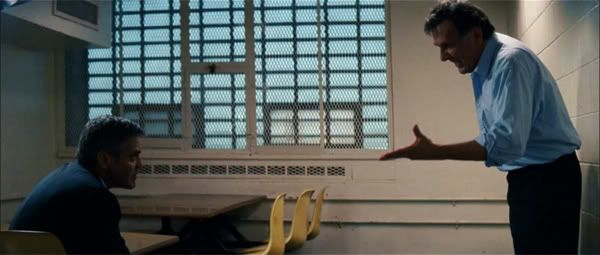
Denouncing corporations like Starbucks, McDonald's or WalMart seems to be almost a reflex these days. Most people would tend to agree some the corporate business practices of these companies and their ethics leave much to be desired, but it's hardly a revolutionary stance. The question put forth by screenwriter Tony Gilroy in his directorial debut Michael Clayton is: "What if you're part of the machine?" While the plot revolves around a legal case involving the shady dealings of a Monsanto-like corporation, it is ultimately about the ethical choices we make in trying to put food on the table, keep the lights on and take care of the ones we love. What if the company we work for creates a product that might harm people? What if our position at a company indirectly makes someone's life difficult? What are we willing to live with and what are we willing to sacrifice? These are the kind of questions that Gilroy's intelligent script quietly draws out. As the film progresses, the lines of personal ethics are drawn and redrawn, as lives become shattered and people seek redemption. A smart, engaging film, Gilroy's first effort is a welcome throwback to the lean, muscled genre pictures of the '70s twisted with a touch of a modern day politics.
7. Sunshine (Danny Boyle)

Director Danny Boyle has never been one to stick to a specific style or genre. From the drug fuelled shenanigans of Trainspotting, to the redefined zombies of 28 Days Later... to the family fantasy of Millions, Boyle has enthusiastically thrown himself full throttle into new challenges with each picture. When Boyle's next film was announced to be a sci-fi epic about a mission to reignite a dying Sun, the shift in stylistic gears was hardly surprising. If that was somewhat expected, then the depth of Alex Garland's script was the real treat. What begins as a 2001: A Space Odyssey styled meditation on man and the universe, quickly mixes elements of Agatha Christie's Ten Little Indians and religious faith to create a film that is a surprisingly moving ode to our place in the galaxy. That Boyle manages to get these ideas across in the construct of a thriller is all the more powerful. Sunshine pays tribute to the classic science fiction films that came before while deservedly carving out its own place alongside those works. So what's Boyle up to now? He's in India filming a comedy about an illiterate child who wants to become a contestant on the Hindi version of Who Wants To Be A Millionaire? Once again, Boyle is going where the challenges are, and as long as he keeps doing that, audiences are in for years of unique, new films from an under-appreciated director.
8. Into The Wild (Sean Penn)
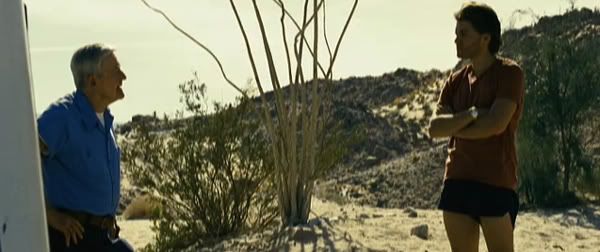
The premise of the film sounds like a college activist cliche. A university graduate gives away his savings, gets rid of his possessions, burns up his social insurance card and decides to live off the grid and discover America. Add vocal activist Sean Penn to the mix and you have the recipe for a strident polemic against contemporary America. But that's not what happens. Based on a true story, Penn's film is less concerned with the politics behind Christopher McCandless' decision than with the journey. Penn's direction works because it never devolves into simpleminded judgments or pat summaries of the characters. What emerges is a complex story of failed parenting, mule-headed youth, idealistic dreams all while paying tribute to an America that is slowly disappearing to strip malls and box stores. The film plays out like a long form version of the closing, moving sequence in Spike Lee's 25th Hour in which the father of a convicted felon considers for one moment, helping his son escape his fate by driving him across America, showing him the wonders of such a huge country that he has yet to experience. In many ways, Penn's film shares Lee's heart. As we follow McCandless across America to his final destination - Alaska - Penn's on location shooting beautifully captures the oddities, wonders and beauty of some of the most unique sites on this continent. While Penn can come across as simplistic and abrasive with his politics off camera, behind it, he displays a great composure and a genuine admiration for the richness of the people and places that span the land between the oceans. And if McCandless' ultimately heartbreaking journey was worth anything, it was for those moments when he found a place for himself in a world that all too often moves too quickly.
9. The Bourne Ultimatum (Paul Greengrass)

Bold themes? Nope. Groundbreaking narrative technique? Nope. A moving, touching story about a struggle to overcome a personal obstacle? Hell no. So what makes The Bourne Ultimatum one of the year's best films? Nothing but a nearly flawless execution of directorial control and editing acumen. In a cinematic world where studios foist upon audiences unnecessary and ridiculous sequels to Die Hard and Rambo, the Bourne series continues to be a breath of fresh air, pumping new, vibrant blood into the action and spy genres. The third installment, which finds Jason Bourne on a quest to find out why and who made him into a ruthless assassin, is easily the best of the lot. Lean and efficient there isn't a moment wasted here, as we follow Bourne from England to Spain to Morocco and finally the United States as he tries to find answers. Greengrass ups the pulse, by shooting many of the fight sequences with handheld digital cameras requiring editing so crisp and quick it would make MTV cry. Intentionally breathless and relentless paced the Bourne Ultimatum is a thriller for the digital era with the sensibilities of classic spy films gone by.
10. 3:10 To Yuma (James Mangold)
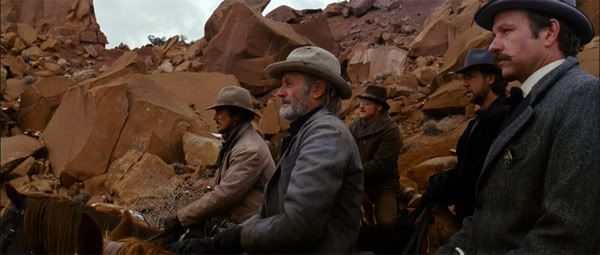
Like an American twin of Danny Boyle, James Mangold has also been a difficult director to pin down. His debut feature, Heavy was an elliptical, gorgeous and criminally underappreciated tale of unrequited love and suppressed ambition. From there he went on to man such diverse films as Cop Land, Girl, Interrupted and Identity before hitting Academy gold with the Johnny Cash biopic Walk The Line. 3:10 To Yuma, a remake of the minor 1957 Delmer Daves classic, is about the wily cat and mouse game between outlaw Ben Wade and his prison escort, rancher Dan Evans. Mangold wisely doesn't stray much from the original, and allows his two leads - Russell Crowe and Christian Bale - to flesh out the characters more fully, while darkening the edges around the film to play better for a modern audience. While films like Unforgiven and the aforementioned Assassination Of Jesse James By The Coward Robert Ford aspire to greater thematic goals, Mangold's film is unique in being one of the rare westerns in recent memory that wants nothing more to be an entertaining popcorn chomper. On that note, the film succeeds brilliantly, building effectively to its memorable final showdown.



1 comment:
3:10 to Yuma is a great western. The ending will surprise you. It is memorable.
Post a Comment